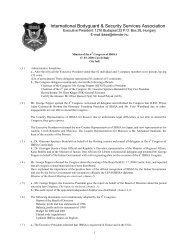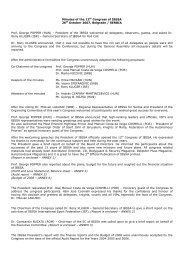Create successful ePaper yourself
Turn your PDF publications into a flip-book with our unique Google optimized e-Paper software.
La rivista del dirigente sportivoIBSSA official magazine36 Sportivosecurity tutelage, in his widest meaning,is prerogative of the State.Consequently, actions that move in thissphere, either from the precautionaryviewpoint or repressive, are publicpowers explications.In this centralist vision all self-preventioninitiatives are left out from anyone.The reference normative cadre is limitedby the consolidated act of public safetylaws, approved with royal decree 18 thjune 1931, nr. 773, from the relevantexecution regulations, issued with royaldecree 6 th may 1940, nr. 635, fromlaw 1 st april 1981, nr. 121 (administrationpublic safety reform), from royaldecree 4 th June1914, nr. 563 (privatevigilance institutes regulations), from rdl26 th september 1935, nr. 1952 (securityguard service regulations, law 29 thmarch 1936, nr. 508), from rdl 12 thnovember 1936, nr. 2144 (private vigilanceinstitutes regulations, law 3 rd april1937, nr. 526) and about private invesatigationalso from art. 222, legislativedecree 28 th July 1989, nr. 271 (ofaccomplishment, of coordination andprovisional regulations of code of criminalprocedure).Precisely from this whole of laws wededuce that the State keep strong inhands of public powers authorities aboutprotection of people and of their goods.This principle choice has an exceptionthat, really, is’nt remained marginalbecause the demand of the marketextended his emphasis. In fact the consolidatedact of public safety laws leavesin part to the private individual thefaculty to share in the tutelage of thegoods through the employment of peculiarsecurity guards, depending on vigilanceinstitutes, or engaged by ownersof the same goods to defend.So, thanks to the provision of articles133, 134 of Tulps and 249, 260 of theexecution regulations, is emerged anddeveloped the entrepreneurial class ofprivate vigilance, interpreted before inconcurrence tuth public powers; but latermore and more like an independent kindof supplying of services more and moreprimary in the complexity of our societyand, why not, of our economy. If it’sthrue in a viewing exquisitely entrepreneurial,is also thrue that the opening tothe private person work by the Tulps isan exception to the general principlewho we’re talking about (because fromhere originate the difficulties to arrangethe Bodyguard figure in law), of thelegal ownership from public police forcein the institutional safeguard of personsand goods. Just for this reason the authorizationconceded for the fulfilment ofvigilance services is subordinated to theverification of the basic assumption ofthese services on the territory in sharingwith the public force. Not only, but subsequentlyit falls under the competencedovremmo concludere che il body guard— salvo travestirsi da autista o factotum— non è in regola con la legge.Il fatto è che, nel nostro ordinamento giuridico,la tutela della sicurezza, intesanella sua più ampia accezione, è compito(o prerogativa) dello Stato. Pertanto,le azioni che si muovono in questocampo, sia in chiave preventiva cherepressiva, altro non sono se non esplicazionidi pubblici poteri.In questa visione centralistica si escludeogni iniziativa di autoprevenzione daparte di chicchessia.Il quadro normativo di riferimento è circoscrittodal Testo unico delle leggi diPubblica Sicurezza approvato con regiodecreto 18 giugno 1931, nr 773, dalrelativo regolamento di esecuzione emanatocon regio decreto 6 maggio1940, nr 635, dalla legge 1° aprile1981, nr 121 (Riforma dellaAmministrazione della pubblica sicurezza),dal regio decreto 4 giugno 1914,nr 563 (Regolamento per gli istituti divigilanza privata), dal Rdl 26 settembre1935, nr 1952 (Disciplina del serviziodelle guardie particolari giurate — v.legge 29 marzo 1936, nr 508), dal Rdl12 novembre 1936, nr 2144(Disciplina degli Istituti di vigilanza privata— v. legge 3 aprile 1937, nr 526)e per quanto attiene alle investigazioniprivate anche dall’art. 222 del D.leg.vo28 luglio 1989, nr 271 (Norme diattuazione, di coordinamento e transitoriedel codice di procedura penale).Da questo insieme di norme, appunto, sidesume che lo Stato mantiene ben saldenelle mani dei pubblici poteri le competenzein tema di tutela delle persone edei loro beni. Questa scelta di principiovede un’eccezione che, per la verità,sarebbe rimasta di portata marginale senon fosse stata la domanda del mercatoa estenderne il peso e l’estensione.Infatti il Testo unico delle leggi diPubblica sicurezza lascia in qualchemisura ai privati la possibilità di concorrerealla pubblica funzione di tutela deibeni, mediante l’impiego di guardie particolarigiurate dipendenti da istituti divigilanza, oppure assunti dai proprietaridei medesimi beni da tutelare.Così, grazie al disposto degli art. 133-134 del Tulps e degli art. 249-260 delregolamento di esecuzione, si è delineatae poi sviluppata l’imprenditoriadella vigilanza privata, intesa in unprimo tempo in funzione di concorsocon i pubblici poteri, ma poi sempre dipiù come autonoma forma di fornitura diservizi sempre più essenziali nella complessitàdella nostra società e, perchéno, della nostra economia.Se questo è vero in un’ottica squisitamenteimprenditoriale resta però anchevero che l’apertura all’opera di privatioperata dal Tulps resta un’eccezionerispetto al principio generale sul qualeof the State also the authorization, thecontrol over the behaviour and the organizationof vigilance enterprises or overparticular security guards engaged byprivate persons. If in the sphere of tutelationof goods the legislator lefts collaborationscopes for proprietaries or vigilanceenterprises that are able to supportthe State in the everyday work of safeguardof the public order, we do’nt findthe same broadmindedness in the sphereof the tutelage of physical wellbeingof persons.So if within certain limits exists alwaysthe opportunity (now wide) to organizein the entrepreneurial way the supplyingof vigilance services for avoiding thesubtraction or the deterioration of goods,the service of tutelage of the person is’ntthe subject of private conventions.Police of the State provides for the tutelageof the physical wellbeing of persons.With this introduction — without anticipatingconclusions that must derive fromthe reality actually asserted in years, butalso from appeals of legislation reformation— we can say that, with the presentlegislation, the vigilance institution or thesecurity guard that instead of a legitimevigilance over goods, can do an activityof tutelage or of defence of persons, canmisuse certainly the licence, exposinghimself to all consequences that derivefrom this abuse in accordance with law.What we’re doingWe realized international courses in theNorth of Ireland, Hungary, and in Italywith a bimonthly operative flow.In the <strong>2004</strong> calendar we can alreadyinsert:Italy - Milano - from 5 th to 7 th march:professional training for security operator, 1 st , 2 nd e 3 rd level ;Italy - Milano – from 13 th to 14 th march:master of shot and personal defenceHungary – september: 3 rd internationalqualification course;But in fact the Ibssa choice is larger thannormal courses. A specifical protocolsubscribed by our central office inBudapest with affiliate Fbi (FederalBureau of Investigations) allows to membersto participate to activities of academy:simulations in urban environment ofescorts with 2, 3, 4, 5, 6, 7, or 8 operators;simulations in urban environment of environmentalreclamationssimulations in urban environment of raidsin apartaments with a single operator orin team;study of stress situations with a qualifiedpsychologist;and a lot of other things that i do’nt listfor brevity.It can be enough this possibility — theFbi — for saying that we are on theright way. Indeed there’s something else:
















